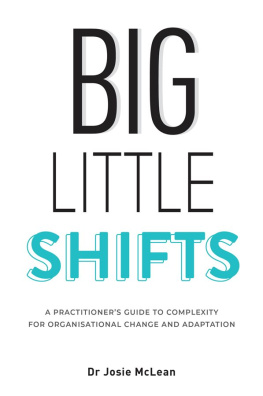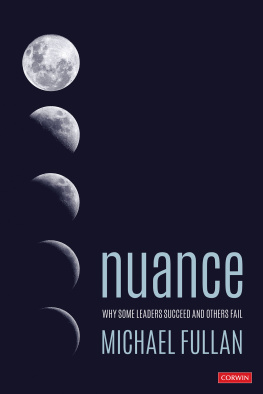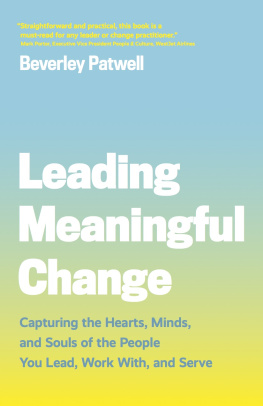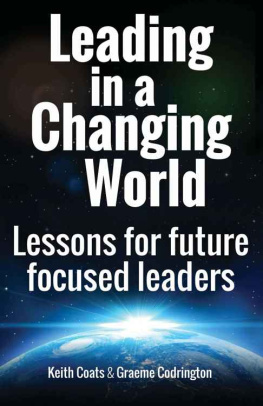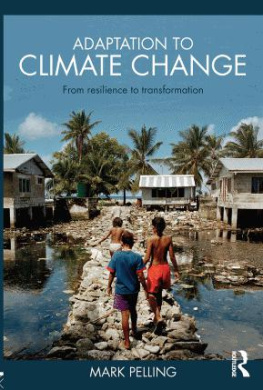
Published by The Partnership Pty. Ltd.
Copyright 2020. All rights reserved. No portion of this publication may be used, reproduced or transmitted by any means, digital, electronic, mechanical, photocopy or recording without written permission of the publisher, except in the case of brief quotations within critical articles or reviews.
First edition, 2020
ISBN: 978-0-6488650-0-1 (paperback)
ISBN: 978-0-6488650-1-8 (ePub)
The Partnership Pty. Ltd.
PO Box 192
Blackwood 5051
South Australia
Australia
www.the-partnership.com.au

Dedication
T his book was written during the summer of 201920 in Australia. It was a summer characterised by major bush fires in all states, but particularly in the south eastern portion of Australia. Lives and livelihoods have been lost. The full cost is incalculable.
The summer, droughts, fires, water shortages, fish kills and then floods, was an awakening for the Australian public with regard to the immediacy of climate change. It was followed quickly by the novel Coronavirus global pandemic. I am finishing this book just as we are easing lockdown restrictions during May in Australia and feeling the uncertainty of the economic damage done in addition to the knowledge that normal is unlikely to ever return.
Adequately responding to climate change, still a stronger threat than the pandemic, will demand deeper cultural changes within society, businesses and enterprises of all sorts as we come to appreciate the true complexity of the challenge and learn more about how to meet that complexity.
I dedicate this book about how to influence organisational adaptation and change in complexity to every firefighter, health care worker and self-inspired volunteer. You are demonstrating what distributed leadership and emergent action looks like within a living system.
Thank you.
Acknowledgements
I want to acknowledge and thank all who have inspired my learning and subsequently, this book. Some CEOs, in particular, have offered me unique opportunities to play within their organisations. I do not mean that flippantly; I mean that they have allowed me to experiment and learn about the transition we will be exploring. Some CEOs have not enabled the experimental space, and I have learned a great deal from those experiences too. To all the managers, team leaders and people that I have come into contact with in either coaching or leadership programs I thank you. You have educated me!
I also wish to thank my colleague Dr Sam Wells as we explored the theory in action often together. His enormous conceptual capacity is matched by his humanity.
In addition, my thinking of course stands upon the shoulders of some seriously big thinkers many of whom I have had the privilege of working with in person. My major influences have been Donella Meadows, Peter Senge, Margaret Wheatley, Fritjof Capra, Ronald Heifetz and Dexter Dunphy. I have cited these authors directly where relevant so that you can follow your own trail of learning too.
Finally, I wish to acknowledge the time writing this book has taken and the understanding and support that has been provided by my husband Duart. No greater love hath a man than to encourage his wife to author a book!
Thank you.
PROLOGUE
Leadership during crisis
I completed the first draft of this book as the bushfires raged in Australia during the summer of 2019-20. Who knew that at that very moment, the seeds of a global transformation were already taking root in a place that few of us had previously heard of Wuhan, China? This prologue aims to acknowledge the recent world changing events, make links between it and the content, and add some relevant thoughts about leading change during a crisis.
The Coronavirus/COVID-19 pandemic has only made the contents of this book even more relevant. I am not expecting that we will snap back to pre-pandemic conditions at all. Even though the lure of the familiar will be very strong, going backwards in time is not possible (with current technology at least). The changes made in response to the immediate threat that this virus poses to our societies have been pervasive and deep. The adaptations have challenged us as social beings used to touching each other and being in the company of others. These big little shifts, small changes to the simple rules at the heart of our cultures (identified in Chapter 4) have catalysed major emergent changes across many systems. Major systems such as politics, health, employment, transport, education, technology, and even our natural environment. We are experiencing a whole systems change. How long will we need to continue living like this? What will be the long term effects of these adaptations we have made? Time will tell, but the theory would suggest that we can expect the legacy of these days will live on.
As I write, a vaccine is not yet visible on the immediate time horizon and many of us are living in lockdown isolating ourselves to suppress the transmission of the virus within our societies. Some countries and communities are proving more successful at this strategy that others. The stimulus to change provided by the virus, brings the values at the heart of adaptive change into stark relief (Chapter 7, Element 3). Do we value our health system and peoples lives more than the economy? Is the choice as stark as that? Some countries, such as the USA seem to believe that its not a clear cut choice. Some argue that a weakened economy will also cost lives and that argument is made within the context of that countrys history, cultural preferences for individual liberty, and much weaker social welfare nets. In Australia, the response has been very different. We have seen the Australian federal government form a national cabinet with state government leaders to create a united approach but one that may be applied with local nuances within the context of each state. Weighing up the values of life versus economy, Australia has clearly chosen lives. The governments have used their authority to put in place social distancing restrictions. And even in the process of distancing, values were clarified in a short period of time, as people developed a preference for the term physical distancing to make it clear that we humans all need and continue to desire social contact.
Using what we already know in an emergency
During the initial stages of the pandemic, a focus of leadership during a crisis has emerged. An emergency requires action with clear direction, comforting confidence, clear communication and messages. The clear direction comes from what we already know. Within this book, I draw on Heifetz, Grashow & Linskys (2009) terminology of a technical challenge (Chapter 7, Element 2). An emergency is initially technical and the authority figure uses a great deal of telling. The telling within the context of an emergency however, needs to be undertaken with empathy. An understanding of what people are experiencing, and communicating with them through that understanding. New Zealands Prime Minister, Jacinda Ardern has become the textbook example of how to do this well. Perhaps she has learned from vast experience she has lead her country through three major emergencies during her first term as PM. If you havent watched Arderns Facebook live video chat with her nation as they all prepared to hunker down for four weeks, I highly recommend it. She is demonstrating the provision of the services of authority (identified in Chapter 5) to her people with tremendous poise.
Next page
